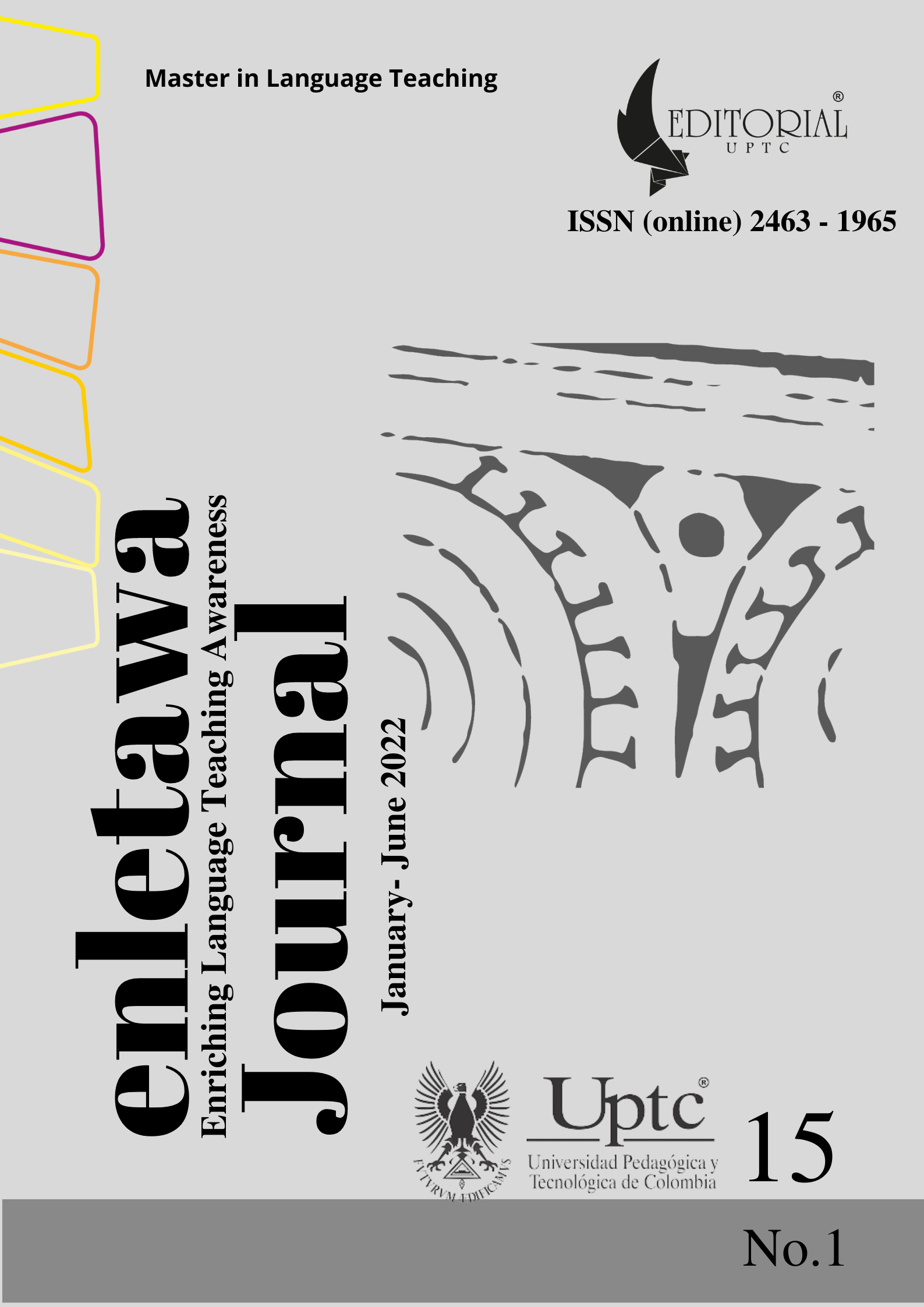Traditional Colombian Games in Virtual and in-Person Education

Abstract
The main object of this research study was to enhance the Communicative Competence of fifth graders through the use of traditional Colombian games in virtual and in-person settings in an EFL classroom. The participants of this research study were thirty-three (33) students from a public school in Tunja, Boyacá, Colombia. This study is framed as qualitative Action Research. The methodological procedure implemented to collect data was based on the application of seven (7) workshops based on traditional Colombian games where the students were able to strengthen their Communicative Competence and use language in authentic school contexts, virtually and in-person classes. Three different instruments were taken into account in order to collect data: Video recordings, semi-structured interviews and a field journal. The findings of this research study revealed that the use of traditional Colombian games developed the Communicative Competence of the students, giving them tools to communicate in an authentic school context and not only during the development of the workshops but from now on as well. Regarding the motivation, it was evident that being able to interact with their classmates and teachers during the implementation of the games, made the students feel more comfortable and willing to participate in the activities proposed. Finally, the versatility of the workshops is a useful tool that allows us to cover much more topics, levels of language and settings (virtual and in-person) than usual
Keywords
Communicative Competence , traditional Colombian games, authentic school context and versality, virtuality, in-person classes
Author Biography
ALBERTO RAMÍREZ AVENDAÑO
Works as a full-time teacher of English at the School of Languages at the UPTC (2010-2022). He obtained his B.A. in English – Spanish teaching in 2000 from this same university. He participated in the Exchange Teacher Program of Amity for 7 years in Cincinnati (Ohio – United States, 2003-2010). In 2013 he received his MA diploma in Language Teaching from the UPTC
JOHANNA MILENA AVELLA GUTIÉRREZ
She holds a B.A in Foreign Languages English-French in 2022 from Universidad Pedagógica y Tecnológica de Colombia. She participated in the Intercultural Exchange Program of Au Pair for 2 years. (Oakland, California and Ithaca, New York (2019-2021).
MARÍA PAULA RINCÓN SILVA
She received her B.A. in Foreign Languages English-French in 2022 from Universidad Pedagógica y Tecnológica de Colombia. She was part of the Intercultural Exchange Program Au Pair for two years in Boston, Massachusetts (2018-2020)
References
- Armostis, S. (2013, May 7th). Communicative Competence. Linguisticator.
- http://www.linguisticator.com
- Baradaran, S., Hasankala, Q., Shojaee, A., Unesi Z. (2018). The Effects of Traditional Games on Preschool Children’s Social Development and Emotional Intelligence: A Two - Group, Pretest - Posttest, Randomized, Controlled Trial. Modern Care Journal, 15(1), para. 9. DOI: 10.5812/modernc.66605 DOI: https://doi.org/10.5812/modernc.66605
- Breiki, M., and Yahaya, W. (2020). Using Gamification to Promote Students’ Engagement While Teaching Online During COVID-19. Teaching in the Post COVID-19 Era. 443-453. DOI: 10.1007/978-3-030-74088-7_44 DOI: https://doi.org/10.1007/978-3-030-74088-7_44
- Calvo, Y. (2015). Using traditional board games in EFL classes to focus on pronunciation. Humanising Language Teaching, 17 (1), para. 9.
- https://www.academia.edu/21767970/Using_traditional_board_games_in_EFL_classes_to_focus_on_pronunciation
- Clark, J., Porath, S., Thiele, J., & Jobe, M. (2020). "Action Research". NPP eBooks. p. 8. https://newprairiepress.org/ebooks/34/
- Dolati, R., & Mikaili, P. (2011). Effects of Instructional Games on Facilitating of Students’ Vocabulary Learning. Australian Journal of Basic and Applied Sciences. 5(11), 1218-1224.
- DOI: https://www.researchgate.net/publication/216755496
- Liu, F., Vadivel, B., Rezvani, E., Namaziandost, E., (2021). Using Games to Promote English as a Foreign Language Learners’ Willingness to Communicate: Potential Effects and Teachers’ Attitude in Focus. Frontiers in psychology.
- https://doi.org/10.3389/fpsyg.2021.762447 DOI: https://doi.org/10.3389/fpsyg.2021.762447
- López, M., Ramirez, O., & Arango, M. (2021). Aprendizaje del inglés bajo las políticas del Ministerio de educación en colombia: voces desde el aula de clase. Boletín redipe. 10 (12): 200-215. DOI: https://doi.org/10.36260/rbr.v10i12.1580 DOI: https://doi.org/10.36260/rbr.v10i12.1580
- Macedonia, M. (2005). Games and Foreign Language teaching. Support for learning. 2 (3) 135-140. DOI: https://doi.org/10.1111/j.0268-2141.2005.00377.x
- https://www.macedonia.at/wp-content/uploads/2012/08/Macedonia_Games_2005.pdf
- Mahyoob, M. (2020). Challenges of e-Learning during the COVID-19 Pandemic Experienced by EFL Learners. Arab World English Journal. 11 (4) 351-362.
- DOI: https://dx.doi.org/10.24093/awej/vol11no4.23 DOI: https://doi.org/10.24093/awej/vol11no4.23
- Nordquist, R. (2019). Communicative Competence Is Key to Social Acceptance. ThoughtCo.
- https://www.thoughtco.com/what-is-communicative-competence-1689768
- Prensky, M. (2001). “Fun, play and games: What makes games engaging”. Digital
- Game-Based learning. McGraw-Hill.
- https://marcprensky.com/writing/Prensky%20-%20Digital%20Game-Based%20Learning-Ch5.pdf
- Racheva, V. (2017). What Is Virtual Learning? VEDAMO. https://www.vedamo.com/knowledge/what-is-virtual-learning/
- Rusiana & Nuraeningsih (2016). Teaching English to Young Learners through Traditional Games. Language Circle: Journal of Language and Literature. 10(2), 193-200.
- DOI: https://journal.unnes.ac.id/nju/index.php/LC/article/view/5729/4602
- Sierra, J. & Kaminski, R. (1995). Children's traditional games : games from 137 countries and cultures. Phoenix, AR: Oryx Press. https://www.worldcat.org/title/childrens-traditional-games-games-from-137-countries-and-cultures/oclc/32922238
- StojkoviĤ, M. & JerotijeviĤ, D. (2011). Reasons for Using or Avoiding Games in an EFL Classroom. CORE. 940-947.
- https://core.ac.uk/download/pdf/153447295.pdf
- Tümen-Akyıldız, C., Seçil, V., & Ahmed, K. (2021).The impact of Covid-19 pandemic on EFL classes through the lenses of secondary learners. Shanlax International Journal of Education. 9 (4), 389–406. DOI: https://doi.org/10.34293/education.v9i4.4210
- DOI: https://doi.org/10.34293/ education.v9i4.4210
